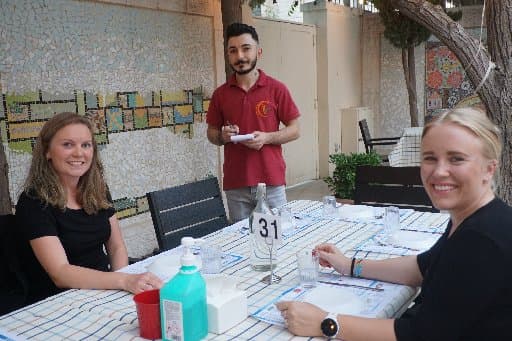AMMAN, Jordan — Located in a leafy historic district of the Jordanian capital, St. Joseph’s Church has married Italian cuisine with Iraqi skill to provide unique training opportunities to young refugees who escaped religious persecution and sectarian violence in their homeland.
The church’s relaxing courtyard has become the venue of Mar Yousef’s Pizza, a dining club often frequented by Jordanian church members, expatriate humanitarian workers, and lovers of delicious Italian food.
The popular gathering place is the brainchild of Italian Father Mario Cornioli and Father Wisam Mansour, a native of Beirut. They felt the church club needed another dimension at a time when Iraqi Christians were fleeing to Jordan from Islamic State militants who overran their historic towns on the Ninevah Plain.
“It’s serving pizza and pasta because I am Italian,” said Cornioli with a laugh, “and you know that we are very famous for good food.”
“I arrived in Jordan with the Iraqis about seven years ago,” the priest from Fiesole, near Florence, told Catholic News Service. He is a part of the Fidei Donum (“The Gift of Faith”) program, ministering with the Latin Patriarchate of Jerusalem.
“We started an emergency work at the church. Rooms were opened to host these guests in the various parishes in the country. The refugees then said, ‘Please, Father, we don’t want to stay at home doing nothing.’ So, we began to think about doing something different from the usual carpentry and IT skills offered elsewhere,” he said.
“We wanted the training to use their time and abilities in the best way and not to waste time as they waited for resettlement in the West. The aim was for the Iraqi Christian refugees to learn a livelihood skill, a professional training that would help them in the future,” he explained.
Italian chefs initially came from Italy to lead classes, turning their students into chefs and “pizzaoli,” or pizza makers.
“After five years, the quality of the food is still the same, maybe even better than the beginning. So, we are very proud of the project,” Cornioli said.
Twenty people are currently being trained and receive cash for their involvement. The payment “has allowed them to live with dignity,” the priest said, stressing that the skills they are learning will carry them into the future.
Aydin Kldan, 24, is one of the 100 Iraqi men who have learned Italian cooking. Born in Telskuf, 19 miles north of Mosul, he and his siblings were visiting an uncle’s home when Islamic State militants stormed the town in August 2014.
“At the time, my mother and father traveled to San Diego to see my grandfather who was very sick there. My uncle had a lot of friends in government who phoned him, warning him to leave immediately to seek safety because of the very dangerous advance of these extremist fighters,” he told CNS.
Kldan, 17 at the time, and others packed quickly and fled. He recalled how 14 people crammed into two cars to escape. The usual three-hour trip to his parent’s house in Kirkuk took nine hours because they had to pass through dozens of police checkpoints and roads were clogged with anxious Christians fleeing the militants.
Additional threats to his father’s business forced Kldan and family members to seek safety in Jordan. Their goal is to resettle in Australia or Canada.
For now, Kldan is learning cooking skills.
“I started here as the guy preparing shisha (smoking a traditional tobacco pipe), then took on reservations when my English improved,” Kldan explained “Afterward, I was the accountant and now, I am manager. Sometimes I help with cooking, even making pizza, when we have a lot of requests.”
Other Iraqis are making gelato and Italian cheeses.
“We all left Iraq for the same reason: Islamic State and militant threats. Although we have different personal stories, we share the same cultural background and are so close to each other. We are like a second family. We’ve learned so much here,” Kldan said.
Some 100 Iraqi women also have received training in design and sewing skills from an Italian fashion designer and seamstresses in the parish’s “Rafidain,” or Mesopotamia project.
“Some are making leather wallets and bags and are thinking to start a small pop-up shop,” Cornioli said. “Another sews bowties and ties after learning from the Italian women. We have printed silks, some mimicking the colorful tiled mosaics lining the church’s outside walls, also created by the Iraqis. The silks and chiffons are printed in Italy, which the Iraqis fashion into beautiful dresses.
In 2016, Cornioli oversaw the design and sewing of an ivory-colored chasuble with oriental yellow-gold braid for Pope Francis. It was crafted by more than a dozen Iraqi Chaldean Catholic women who asked the pope for prayers for peace.
Australian doctors Yi-An and Yokemei Neoh said they frequent Mar Yousef Pizza because the place “ticks all the boxes” including excellent pasta, fresh salads, and tasty gelato, all served in a beautiful, clean environment. “Everyone is very polite, professional, and attentive,” they said.
Startup funding for the project has been spent and various United Nations agencies assisted during the pandemic so the training could continue. Cornioli said the challenge ahead is to become self-sustaining.
“We need to continue to train up refugees because every year there is turnover as they travel for resettlement in the West, and new ones come seeking training. We have success stories. Our chefs have easily found work when they traveled to Australia and others in different capacities. What we are doing has had a great impact,” he said.
“People are very happy coming here and they enjoy. Also, we, too, are very happy. It’s really a pleasant place to come and you feel like an Italian family atmosphere.”














